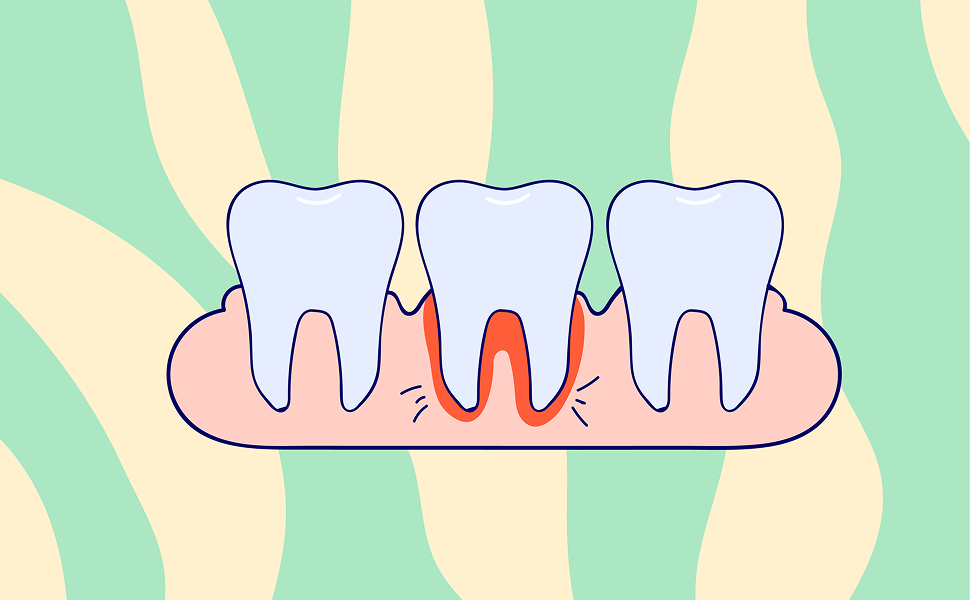
Published on Oct 08, 2025
Last modified on Dec 22, 2025
10 Menopause Symptoms That Might Surprise You
5 min read
When it comes to menopause symptoms, hot flashes, mood swings, brain fog, vaginal dryness, and weight gain tend to have the most air time. But did you know there’s actually 34 (yes, 34!) symptoms of menopause? Here are some of the lesser known symptoms that may pop up alongside hormonal shifts during the peri(menopausal) years.
1. Oral health problems
Yes, even our gums can be affected by menopause. This time in life is associated with a range of less-well-known oral symptoms, like Burning Mouth Syndrome (BMS), dry mouth, altered taste sensations, and inflamed and bleeding gums. The culprit? Surprise, surprise…hormone level changes.
Estrogen helps prevent the breakdown of teeth; progesterone supports bone metabolism. Hormones also help our teeth and gums fight off minor infections, and maintain a healthy supply of good-for-you bacteria. So, when our hormones start going topsy turvy in perimenopause, some women experience oral health symptoms. Hydration and oral hygiene help a ton, and for some women the symptom may get better with menopause hormone therapy/MHT (previously referred to as hormone replacement therapy or HRT). Do note, however, that hormone therapy is only officially indicated for the treatment of hot flashes/night sweats. Learn more >>
2. Headaches & migraines
Before perimenopause, our hormones enjoy a predictable ebb and flow throughout our menstrual cycles. We might occasionally experience menstrual migraines before our period as estrogen levels drop, but for the most part, all is well. Then comes perimenopause, which is marked by one long hormonal fluctuation…helloooo headaches. Post-menopause, it’s low and steady as estrogen levels stabilize and headaches and/or migraines tend to dissipate. While treatment varies between headaches and migraines, hormonal migraines may get better with hormone therapy. Learn more >>
3. Heart palpitations
Palpitations make your heart feel like it’s racing, as if you just ran a marathon or got off a roller coaster. They can happen at any time during the menopausal transition, but they’re typically associated with hot flashes and night sweats.
While there’s a strong case that hormone changes are the culprit, factors like anxiety, intense exercise, caffeine, and alcohol can definitely be triggers too. The good news is, IF your palpitations are related to menopausal hormone changes, MHT may help. Learn more >>
4. Tinnitus
Some women report tinnitus or hearing loss around menopause, as well as other periods of hormonal fluctuations such as pregnancy and around the menstrual period.
There are estrogen receptors in the inner ear and auditory pathways that may be impacted by estrogen drops, perhaps due to changes in blood flow. That said, research has yet to establish a concrete cause-and-effect relationship. Learn more >>
5. Body odor
We sweat a LOT during the menopause transition, whether it’s due to a hot flash or just, ya know, everyday life. And sometimes, despite our best efforts, that means *sniff sniff* body odor.
Hot flashes and night sweats aside, declining estrogen and progesterone also means higher levels of testosterone (produced in small amounts by our ovaries) and cortisol (our stress hormone), both of which have been linked to a stronger body odor.
READ MORE: 6 Deodorants That’ll Stand Up To Excessive Sweating, Hot Flashes & Menopause Odor
6. Dry, Itchy Skin
But because skin has estrogen receptors, this hormone also affects the physiology of our skin cells and overall skin health. Estrogen’s skincare notable mentions include providing skin elasticity and firmness, supporting wound healing, and helping skin maintain moisture…to name just a few.
When levels begin to fluctuate and progressively decline in perimenopause, we lose some of those benefits. Lower estrogen levels mean less collagen production, which explains why many of us notice skin aging symptoms upon entering perimenopause. While not indicated for treatment of dry skin, estrogen therapy can sometimes help. Learn more >>
7. Dry eyes
Just as declining estrogen and progesterone levels impact skin health, they can also impact hydration in the eyes. Specifically, we’re talking about decreased tear production; tears are made up of water, oil, and lipids, and help keep our eyes lubricated, in addition to protecting from infection. So, decreased tear production = less lubrication, and drier, itchier, less protected eyes. This symptom can be exacerbated by overexposure to screens. Learn more >>
8. Thinning hair
Almost every woman eventually develops some form of female-pattern hair loss (FPHL), and while the causes vary, many are a function of aging. Those of us who have been pregnant before might recall hair loss or thinning after giving birth. This is a result of decreases in estrogen and progesterone, which are essential for hair growth. The same thing happens in menopause, except during this stage of your life, decreased estrogen is compounded by relatively higher testosterone, which can also contribute to FPHL. Learn more >>
9. Brittle nails
While certainly more of an unusual symptom, brittle nails are another pesky effect of hormone shifts and dehydration related to estrogen loss. As with dry skin, a good moisturizer, especially around the cuticles, goes a long way! Learn more >>
10. Bloating
For most of us, this isn’t anything new as we’ve (unfortunately) become BFFs with bloating over the years, especially around our period. Bloating often shows up to the party alongside a slew of other digestive issues, such as bowel discomfort, constipation, and diarrhea. During perimenopause, bloating can also be traced back to hormone fluctuations. For this symptom, nutrition is usually our first line of defense. Learn more >>
The Bottom Line
Hormone changes in perimenopause impact, well, just about everything. From common symptoms like hot flashes and loss of libido to the lesser known symptoms of perimenopause like heart palpitations and gum problems, these effects can be genuinely disruptive to quality of life. The good news is, there is a wealth of options, from lifestyle changes and supplements to prescriptions, at your disposal…if you know where to look. (And no, hormone therapy is not the only option, nor is it the best option for every menopause symptom!)
A qualified healthcare provider, such as one of Elektra’s board-certified, menopause-trained clinicians, can work with you to understand the bigger picture behind your symptoms, strategizing on alleviation and long-term health.
READ MORE:


